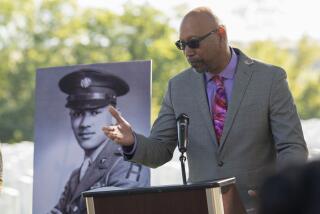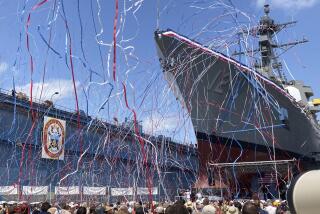Charles A. MacGillivary; Medal of Honor Winner
- Share via
Charles A. MacGillivary, a U.S. Army sergeant who earned the Medal of Honor during World War II by displaying uncommon valor while on a one-man patrol killing 36 elite Nazi soldiers, has died.
MacGillivary, who lost his left arm in the fierce combat in the Battle of the Bulge, died June 25 at a hospital in Boston. He was 83 and the cause of death was complications from a stroke.
For the record:
12:00 a.m. July 13, 2000 For the Record
Los Angeles Times Thursday July 13, 2000 Home Edition Metro Part B Page 8 Metro Desk 2 inches; 40 words Type of Material: Correction
MacGillivary Army unit--In the obituary of Medal of Honor winner Charles A. MacGillivary on July 3, The Times incorrectly reported that Company I, 71st Infantry Regiment, 44th Infantry Division, landed on Omaha Beach on June 6, 1944. In fact, the unit arrived in France on Sept. 15, 1944.
Born on Prince Edward Island, Canada, MacGillivary came to the United States in 1933 when he was 16 to live with his brother in Boston. During the next few years he worked in the Merchant Marine and was in and out of the country.
After the attack on Pearl Harbor, he joined the U.S. Army rather than face the prospect of German U-boat attacks in the Atlantic. While in basic training, he was offered the opportunity to become a U.S. citizen and jumped at the chance.
A member of Company I, 71st Infantry, 44th Infantry Division, MacGillivary landed on Omaha Beach on D-Day and pushed inland, helping to take back town after town from the Germans.
By December 1944, his company was near Woelfling, France, where it became pinned down by the 17th German Panzer Division, which was part of a surprise attack along an 80-mile front aimed at capturing Antwerp, the Allies’ largest port.
“By Jan. 1 we were running out of ammunition and the men in my company were talking about surrender,” MacGillivary recalled in an interview with the Boston Globe years ago. “The Germans were promising us a Christmas dinner if we surrendered. But they’d just march the Americans with hands over their heads in front of a tank and shoot them.”
After the company commander and the deputy commander were killed, MacGillivary took charge. He set out to eliminate several German positions whose constant machine gun fire had been menacing his forces.
Armed with two submachine guns and several grenades, MacGillivary worked his way through the woods, wiping out position after position, either killing or seriously wounding the enemy forces. At the last German position, MacGillivary was hit with a burst from a machine gun.
“I looked down and my arm wasn’t there,” he told the Globe some years ago. “ I tried to stop the bleeding by pressing here,” he said, pointing to the artery in his neck.
“When you get hit by a machine gun, it’s like somebody put a hot poker in you. I stuck the stump of my arm in the snow, but the warm blood melted the snow. I kept scooping snow around it till my hand was freezing. I figured I was dying.”
MacGillivary was picked up by the Free French Troops. “When they rescued me, my arm had a cake of bloody ice frozen around it, sealing the wound,” he recalled. “They put me on top of a Jeep, put a block of ice on my arm, and took me to a field hospital. . . . If it had been summer, I’d be dead.”
The next summer, MacGillivary received the Medal of Honor from President Harry S. Truman. After the war, MacGillivary returned to the Boston area and worked with the Treasury Department and then the Customs Bureau. He retired in 1975.
He was active in veterans groups, helping to finance free Thanksgiving dinners for homeless vets, and in the Congressional Medal of Honor Society.
“Some of the guys take this pretty serious,” he said of winning the nation’s highest military honor. “At conventions, they get upset if I don’t wear the thing to breakfast, and I say to them, ‘What the hell, do you wear it in the shower?’ ”
And although he may have had a light view of the medal, he had strong feelings about his World War II enemy.
“The Germans? I thought they were bastards, and no, I have never bought a German car,” he told a reporter some years ago. “I was in Germany before the war. I never knew what they were doing to the Jews, but I knew what they were doing to the gypsies. I’d come back and tell people, but they wouldn’t believe me.”
He is survived by a brother, three daughters, nine grandchildren and a great-grandchild.
More to Read
The biggest entertainment stories
Get our big stories about Hollywood, film, television, music, arts, culture and more right in your inbox as soon as they publish.
You may occasionally receive promotional content from the Los Angeles Times.










